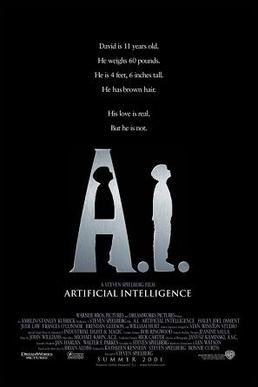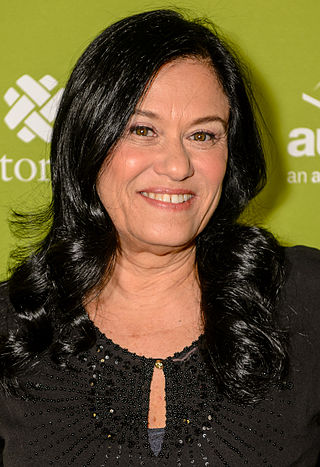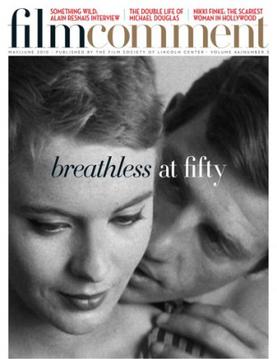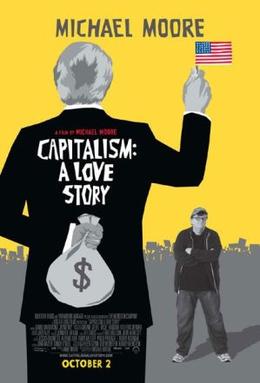
Michael Francis Moore is an American filmmaker, author and left-wing activist. His works frequently address the topics of globalization and capitalism.

Roger & Me is a 1989 American documentary film written, produced, directed by, and starring Michael Moore, in his directorial debut. Moore portrays the regional economic impact of General Motors CEO Roger Smith's action of closing several auto plants in his hometown of Flint, Michigan, reducing GM's employees in that area from 80,000 in 1978 to about 50,000 in 1992. As of August 2015, GM employs approximately 7,200 workers in the Flint area, according to The Detroit News, and 5,000 workers according to MSNBC.

A.I. Artificial Intelligence is a 2001 American science fiction film directed by Steven Spielberg. The screenplay by Spielberg and screen story by Ian Watson were based on the 1969 short story "Supertoys Last All Summer Long" by Brian Aldiss. Set in a futuristic post-climate change society, the film stars Haley Joel Osment as David, a childlike android uniquely programmed with the ability to love. Jude Law, Frances O'Connor, Brendan Gleeson, and William Hurt star in supporting roles.

Bowling for Columbine is a 2002 documentary film written, produced, directed, and narrated by Michael Moore. The film explores what Moore suggests are the primary causes for the Columbine High School massacre in 1999 and other acts of gun violence. He focuses on the background and environment in which the massacre took place and some common public opinions and assumptions about related issues. The film also looks into the nature of violence in the United States, and American violence abroad.

Michael Moore Hates America is a documentary film directed by Michael Wilson that criticizes the work of film director Michael Moore.

Richard Nelson Corliss was an American film critic and magazine editor for Time. He focused on movies, with occasional articles on other subjects.
Armond White is an American film and music critic who writes for National Review and Out. He was previously the editor of CityArts (2011–2014), the lead film critic for the alternative weekly New York Press (1997–2011), and the arts editor and critic for The City Sun (1984–1996). Other publications that have carried his work include Film Comment, Variety, The Nation, The New York Times, Slate, Columbia Journalism Review, and First Things.

Barbara Kopple is an American film director known primarily for her documentary work.

Down in the Valley is a 2005 American neo-western film starring Edward Norton, Evan Rachel Wood, David Morse and Rory Culkin. The film made its debut in the Un Certain Regard section at the 2005 Cannes Film Festival on May 13, and made its limited theatrical release in North America on May 5, 2006.
Gerald Peary is an American film critic, filmmaker, editor of the University Press of Mississippi, and a former curator of the Harvard Film Archive.

Film Comment is the official publication of Film at Lincoln Center. It features reviews and analysis of mainstream, art-house, and avant-garde filmmaking from around the world. Founded in 1962 and originally released as a quarterly, Film Comment began publishing on a bi-monthly basis with the Nov/Dec issue of 1972. The magazine's editorial team also hosts the annual Film Comment Selects at the Film at Lincoln Center. Due to the COVID-19 pandemic, publication of the magazine was suspended in May 2020, and its website was updated on March 10, 2021, with news of the relaunch of the Film Comment podcast and a weekly letter.

Manufacturing Dissent: Uncovering Michael Moore is a 2007 documentary film. It puts forward that filmmaker Michael Moore has used misleading tactics, primarily using on-camera statements by interviewees with personal grievances against Moore as proof. The documentary attempts to expose what the creators say are Moore's misleading tactics and mimics Moore's style of small documentary makers seeking and badgering their target for an interview to receive answers to their charges. The film was made over the course of two years by Canadians Debbie Melnyk and Rick Caine after they viewed Fahrenheit 9/11, Moore's controversial film that attacked the Bush administration and its policies. Melnyk and Caine have stated that when they first sought to make a film about Moore, they held great admiration for what he had done for the documentary genre and set out to make a biography of him. During the course of their research, they became disenchanted with Moore's tactics. The title is a parody of the book Manufacturing Consent by Edward S. Herman and Noam Chomsky, and the film it inspired. In June 2007, Liberation Entertainment Inc. signed an exclusive deal with the filmmakers for all video and theatrical rights in the US & UK.

Lone Scherfig is a Danish film director and screenwriter. She has been involved with the Dogme 95 film movement. Scherfig's movies are generally romantic comedies, including her film One Day (2011), based on the David Nicholls's novel of the same name.

Capitalism: A Love Story is a 2009 American documentary film directed, written by, and starring Michael Moore. The film centers on the late-2000s financial crisis and the recovery stimulus, while putting forward an indictment of the then-current economic order in the United States and of unfettered capitalism in general. Topics covered include Wall Street's "casino mentality", for-profit prisons, Goldman Sachs' influence in Washington, D.C., the poverty-level wages of many workers, the large wave of home foreclosures, corporate-owned life insurance, and the consequences of "runaway greed". The film also features a religious component in which Moore examines whether or not capitalism is a sin and whether Jesus would be a capitalist; this component highlights Moore's belief that evangelical conservatives contradict themselves by supporting free market ideals while professing to be Christians.

U.N. Me is a documentary film about the United Nations by first-time filmmakers Ami Horowitz and Matthew Groff. It premiered at the International Documentary Film Festival Amsterdam in November 2009.

Luca Guadagnino is an Italian film director, producer, and screenwriter. His films are characterized by their emotional complexity, sensuality, and sumptuous visuals. He is also known for his frequent collaborations with actors Tilda Swinton, Dakota Johnson, Timothée Chalamet and Michael Stuhlbarg, editor Walter Fasano and screenwriter David Kajganich.

For the Love of Movies: The Story of American Film Criticism is a 2009 documentary film dramatizing a hundred years of American film criticism through film clips, historic photographs, and on-camera interviews with many of today’s important reviewers, mostly print but also Internet. It was produced by Amy Geller, written and directed by long-time Boston Phoenix film critic Gerald Peary, and narrated by Patricia Clarkson. Critics featured include Roger Ebert of The Chicago Sun-Times, A.O. Scott of The New York Times, Lisa Schwarzbaum of Entertainment Weekly, Kenneth Turan of The Los Angeles Times, and Elvis Mitchell, host of the public radio show The Treatment.
Vulgar auteurism is a movement that emerged in early 2010s cinephilia and film criticism associated with championing or reappraising filmmakers, mostly those working in the horror and action genres and whose work has otherwise received little attention or negative reception in the critical mainstream. It became a controversial topic in the cinephile community following the publication of an article in the Village Voice in 2013 and has been described as "a critical movement committed to assessing the 'unserious' artistry of popcorn cinema with absolute seriousness."
Part of the New Hollywood wave, Kubrick's films are considered by film historian Michel Ciment to be "among the most important contributions to world cinema in the twentieth century", and he is frequently cited as one of the greatest and most influential directors in the history of cinema. According to film historian and Kubrick scholar Robert Kolker, Kubrick's films were "more intellectually rigorous than the work of any other American filmmaker."

Steven Gaydos is an American screenwriter, songwriter, and journalist.















